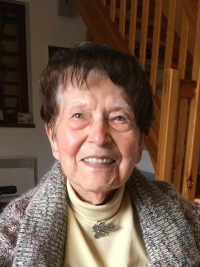And the husband was employed by the bank, and he wanted to be in the foreign department because he could speak French, German and Latin. But it was not of much good for him. And they figured out that he would be the leader to join the communist party. He said, “Look, I'll work the way I worked. But, please, I will not enter any party. I don't like politics. I like work, but I don't like politics. ”And because there was one who aimed at making a carrier, they were friends before, and he said,“ Well, if you don't want to join, then when wood is chopped, splinters also fly.” And because it was again a time when there were 75 thousand workers for manual work available, so straight from that chair he went to the construction site. And there was the hardest work on the construction site. Because there was no such mechanization yet, whole logs were carried on shoulders. Well, the one in front was somehow slipped, the one in the middle fell down and the whole load fell down on my husband. He remained lying, so the ambulance immediately took him away and they thought he would not survive. Imagine, his friend, a neurologist, who was in the hospital again, and he said, "Look, don't worry, we'll put it together somehow, but you won't be working for a long time to allow it all grow back together again." They have to take you back to work in the bank. It's not possible for you to be fired like this and crippled like that. You have small children. ”The youngest one was half a year old. So I stayed at home with kids. Then he was in the hospital for a month. Then he went to ask about the job. And that guy again who was already quite a someone, he said, "No, no, no, that's not possible." They didn't take him back. So he was jobless and out of money. Those who wanted to help him, the others, his friends, so whenever he got there, everything was good, so they said, "Don't be mad at us, you have a bad staff report, we can't take you." You know, he was without any work for half a year. I know what it was like to be out of work back then. Children were small and no work. Just because someone didn't like him.
